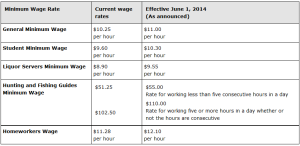On June 1, 2014 the minimum wage in Ontario will increase to $11.00 per hour for most employees.

This change is going to have an impact on both Ontario businesses and wage earners. If you are a small business owner make sure you have all the facts ahead of time.
DEFINITIONS
General Minimum Wage – this rate applies to most employees
Student Wage – This rate applies to students under the age of 18 who work 28 hours a week or less when school is in session, or work during a school break or summer holidays
Liquor Servers Wage – This hourly rate applies to employees who serve liquor directly to customers or guests in licensed premises as a regular part of their work. “Licensed premises” are businesses for which a license or permit has been issued under the Liquor License Act
Hunting and Fishing Guides Wages – The minimum wage for hunting and fishing guides is based on blocks of time instead of by the hour. They get a minimum amount for working less than five (5) consecutive hours in a day, and a different amount for working five hours or more in a day – whether or not the hours are consecutive
Homeworkers Wage – Homeworkers are employees who do paid work in their own homes. For example, they may sew clothes for a clothing manufacturer, answer telephone calls for a call centre, or write software for a high tech company. Note that students of any age (including students under the age of 18 years) who are employed as homeworkers must be paid the homeworker’s minimum wage.
OTHER IMPORTANT FACTS
Commission Employees: If you have employees who are being paid wholly or in part by commission, their bay must amount to at least the minimum wage for each hour the employee has worked. If said employee is working overtime, the calculation becomes more complicated. There are some industry-specific rules and exemptions regarding commission sales people – follow this link to the Ministry of Labour website for more specific details.
The Three Hour Rule: When an employee who regularly works more than three hours a day is required to report to work but works less than three hours, he or she must be paid for at least three hours at the minimum wage or the employee’s regular wage for the time worked. This rule does not apply to students, employees whose regular shifts are three hours or less, or where the cause of the employee not being able to work at least three hours was beyond the employer’s control.

